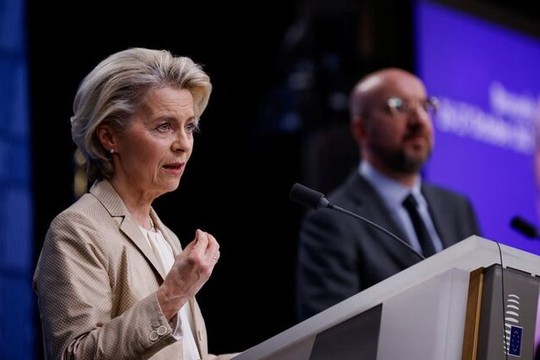European Commission President Ursula von der Leyen: We are sick and tired…
Photo: Reuters
The European Union has officially opened accession negotiations for Ukraine, the bloc announced, a move that Ukrainian President Volodymyr Zelensky called a "victory" after his hope for $54 billion in aid from Europe and $61 billion aid from the US both fell short in just a week, notes ‘The Global Times’.
Experts said the EU membership boost is more of a symbolic gesture or a contingency plan to compensate for the fact that Western allies can no longer provide Kiev with the necessary funds and ammunition, highlighting a fading promise brought by mounting uncertainty from the White House over what kind of administration will take over next year.
The move can be seen as a compensation plan offered by the bloc for not being able to admit it into NATO, an idea that has been tacitly accepted among Western allies, Cui Heng, a scholar from the China National Institute for SCO International Exchange and Judicial Cooperation, told the Global Times.
Cui believes that it is more of a "strategic tactic" to boost Ukraine's confidence at a time when the US and Europe no longer have the ability nor the will to provide as much assistance in terms of funding and ammunition as before.
Furthermore, European countries are facing many uncertainties over support for Kiev, and are hoping to delay the aid process at least until the 2024 US Presidential election, experts said.
Despite "major breakthrough," media reports suggest that there are still many obstacles to the joining process, and it could still take a decade before Ukraine actually joins the organization and enjoys the benefits of full membership.
"Ukraine is still far from meeting the conditions of the Copenhagen Criteria, not only in terms of finance and economy, but also and most importantly, the issue of corruption. Corruption is also where the EU tries to pressurize Zelensky to comply with the directives set by the US, since the current administration is already deeply embroiled in corruption issues," Cui said.
Ukraine will also have to meet other opaque requirements of the Copenhagen Criteria, such as whether or not a candidate country's institutions are fit to uphold European values such as human rights and whether the country has a functioning, inclusive democracy.
"All of those things are hard to prove for any country, let alone one currently in a state of war," said CNN in a report.
Despite the good news, the regional group was unable to pass a crucial $55 billion financial aid package for Kiev at Thursday's summit after Hungary blocked it. It dealt a heavy blow to Ukraine after Zelensky failed to lobby Washington to approve an additional $61 billion in support to buy weapons.
Prime Minister Viktor Orban of Hungary has long voiced obstinate opposition to Ukraine's joining. He had warned before the summit that forcing a decision on the Ukraine issue could destroy EU unity.
In fact, quite a few countries within the EU also have grievances and doubts about the bloc's support for Ukraine, although they may not have expressed it as explicitly as Hungary, observers noted.
The main concern is the potential damage to their national interests. Being a populous and territorially large country, Ukraine would make the already struggling European economy face a significant influx of immigrants and outpouring of financial expenses, putting immense pressure on various resources, Cui said.
read more in our Telegram-channel https://t.me/The_International_Affairs

 10:15 23.12.2023 •
10:15 23.12.2023 •























